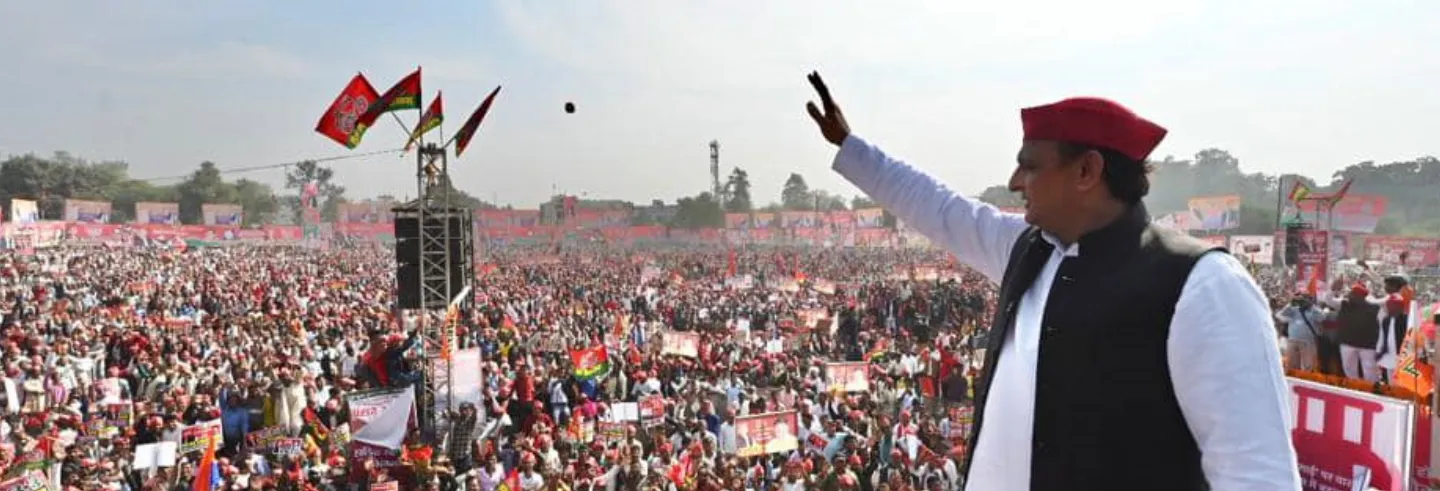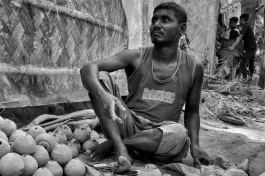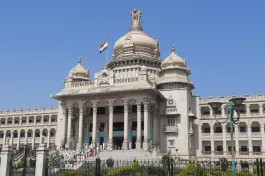Two days before the counting of votes in the assembly election in Uttar Pradesh, the Samajwadi Party (SP) had a foreboding that it would lose to the Bharatiya Janata Party (BJP) for the fourth successive time since 2014. Akhilesh Yadav, the SP president and its projected chief minister, went into the reasons for the expected defeat with his close associates. The SP’s allies—the Rashtriya Lok Dal (RLD), the Suheldev Bharatiya Samaj Party (SBSP), and the Mahan Dal—were not blamed, as parties leading an alliance tend to after a rout. The electronic voting machines were also not held culpable.
The anticipated drubbing was squarely ascribed to the Bahujan Samaj Party (BSP) and its head, Mayawati.
The SP blamed Mayawati for “transferring” her votes “lock, stock and barrel” to the BJP. Yadav and his colleagues believed this was what sent the latter's vote share up. (The BJP got 41.29% of the voteshare in 2022, up from 39.47% in 2017.) Yet the BJP lost 55 seats in this election, bringing its tally down to 255 from 312 in the 403-member legislature.
[A]n honest assessment would have shone the light on the SP’s own flaws and objective circumstances, which did not constitute a happy picture.
It is true that Mayawati was singularly inactive during the assembly polls. She hardly campaigned and when she did, she pointedly attacked the SP and the Congress. Lucknow’s political bazaar, well-oiled and robust even when political activity is at an ebb, was replete with theories about how Mayawati feared that the central government was about to nail her on corruption charges dating back to the time she was the chief minister (2007–2012) and therefore she shifted her Dalit votes to the BJP. Mayawati turned in her worst ever showing; she was down to one seat and lost 10% of the votes.
As yet, there is no hard evidence to prove that the speculated vote transfer actually took place. Instead, an honest assessment would have shone a light on the SP’s own flaws and objective circumstances, which did not constitute a happy picture.
Could the SP, which along with its allies chalked up a better performance than it did in the Lok Sabha elections held in 2014 and 2019 and the assembly poll in 2017, have done more impressively?
Five years ago, the SP had plummeted to 47 seats from 224. It began at the bottom this election season. The BJP, which was down to 47 seats in 2012, catapulted itself into winning 312 seats five years later. Such slingshot scenarios are not improbable in UP, a feudal state, where coaxing long-term allegiances to change is not difficult, where voters are susceptible to falling for half-truths and hyperbole, and where a majority want nothing more from a mai-baap sarkar (a nanny state) than morsels of cereal and an artificial sense of 'pride' derived from faith or caste or an amalgam of both.
The SP had none of the assets and resources the BJP had after running a government that was either open to censure or worthy of praise, depending on which side of the ideological spectrum a voter inhabited. Nonetheless, a significant number of voters were willing to give the SP a chance for a comeback. UP is used to overturning its ruling parties and coalitions mercilessly every five years. But this time, the electors voted conservatively for the status quo. Though the people were forgiving of the SP to an extent, did Yadav exploit the openings ably and adequately?
Retreat after 2017
In hindsight, it is apparent that Yadav's decision to move to Delhi in 2019 as an MP from Azamgarh was a wrong one. Earlier, he had been a member of the legislative council (UP has a bicameral house) after he chose not to contest the 2017 election. Yadav could have remained in Lucknow and led the opposition, challenging Yogi Adityanath, the chief minister, when issues arose. And there was no dearth of issues.
He instead assigned the responsibility of the opposition to Ram Govind Chaudhary, a colleague. As it happens with regional parties dominated by a single leader, the SP’s MLAs and legislative council members refused to even acknowledge Chaudhary’s presence. To the SP, only Yadav, and to an extent, his father, Mulayam Singh Yadav, mattered, and both of them spent an inordinately long time in Delhi.
In hindsight, it is apparent that Yadav's decision to move to Delhi in 2019 as an elected MP from Azamgarh was a wrong one.
Had Yadav anointed one of his close aides, whose association with him went back to the days when they battled the BSP dispensation in pitched street fights, as a proxy in the assembly, the SP might have asserted its status as the principal opposition party more effectively. These aides, former members of the youth brigade, took the easy way out by getting berths in the council, which had zero accountability and demanded no more than the stipulated minimum attendance.
Yadav ought to have learnt from his father’s record. After the 1991 assembly election, in which the SP had been worsted by the BJP, the patriarch did not lose a day in putting the Kalyan Singh government on the mat, be it on agrarian issues or law and order. Mulayam Singh Yadav was not burdened with the fear that it would be “anti-Hindu” and “anti-national” to assail the BJP. In contrast, from day one since 2017, the Akhilesh Yadav-led SP has been too defensive on both counts.
Two examples illustrate its plight. In 2017, Gorakhpur, previously Adityanath’s parliamentary constituency, reported an unusually large number of deaths of infants and children — 1,317 — at the state-run BRD Medical College Hospital. Many of the fatalities were caused by oxygen shortage. A paediatrician, Kafeel Ahmad Khan, tried to save lives by procuring oxygen cylinders with his own money. As sections of the media hailed Khan’s efforts, the BJP initiated a slander campaign, which stymied his efforts.
In the past, when a tragedy or a scam struck UP, the SP’s workers were out on the streets, red and green (the party flag’s colours) bandanas wrapped around their foreheads, daring the cops to strike at them. In 2017, they retreated into a shell. The only show of “solidarity” with Gorakhpur’s victims was a candle march, which was not in sync with the SP’s image and politics. The party was “scared” to politicise the tragedy. But, in 24 hours, the BJP adroitly deflected the narrative from the children’s deaths to Khan and converted the tragedy into a Hindu-Muslim debate. A month ago, perhaps as reparation for his political neglect, the SP fielded Khan to the legislative council election from Deoria-Kushinagar but he lost to the BJP.
In the past, when a tragedy or a scam struck UP, the SP’s workers were out on the streets... In 2017, they retreated into a shell.
In November-December 2020, when several parts of India protested against the amendments to the Citizenship Act to give citizenship to undocumented migrants of every religion, barring Islam, from Pakistan, Bangladesh and Afghanistan, Indian Muslims feared it was a subterfuge to contest their citizenship rights. UP witnessed demonstrations and sit-ins all over. The police forcibly broke up meetings, using force that killed protestors in some places. The SP was again silent although it has a legacy of confronting the establishment, especially a BJP-ruled one, on the streets. The SP was “careful” not to turn the CAA protests to a Hindu-Muslim binary and give the BJP an “advantage”.
Indeed, the SP moved so stealthily on the Hindu-Muslim issue that when Azam Khan, a veteran party leader and a former MP from Rampur, was slapped with a range of charges and jailed with his wife and son for months, Yadav ignored him. It was close to the elections that he flagged the issue, spoke up for Khan and gave tickets to him and his son, Abdullah Azam Khan. The father won from Rampur while the son won from Suar. Yadav was prodded to take cognisance of the Khans because Azam Khan is the SP’s most influential leader, especially in the Rohilkhand region which has the largest minority population in the state.
The SP had been immobile during the pandemic and the absence of its workers on the ground was repeatedly cited as a negative by voters except for the most committed ones.
The SP’s campaign focused on livelihood matters (agrarian problems; unemployment; a new pension scheme that linked pensions to market vagaries; inflation; the pathetic Covid-19 management; and large-scale destruction of crops by rogue cattle) and steered clear of religion, especially Hindutva.
Reasons for failure
Two factors in particular beat the SP. Hindutva has permeated deep into the political consciousness of UP’s Hindus, across the caste spectrum. While few might have articulated its influence on voting in recent elections, the SP’s “identification” with Muslims and the BJP’s allegation that it would “appease” minorities and “patronise” Muslim “criminals” (Azam Khan was named as one) played on the Hindu mind.
While Yadav expatiated on Adityanath’s free use of bulldozers to raze properties owned by Muslim criminals-turned-politicians, notably Mukhtar Ansari and Atiq Ahmed, he was unable to answer the BJP’s more persuasive campaign on the SP’s “poor” law and order management. Parsed, this meant that if elected, the SP would restore a regime dominated by Muslim criminals and put Hindu women in jeopardy. The SP’s failure to mobilise women in Yadav's road shows and meetings bolstered the BJP-created perception of women potentially being unsafe.
Hindutva has permeated deep into the political consciousness of UP’s Hindus, across the caste spectrum.
Second, the BJP’s welfare architecture, honed to near-perfection in UP, regrouped the castes and sub-castes (bar the Yadavs) that the SP courted. People considered direct bank transfers and the elimination of the bichauliya (intermediaries who invariably demanded a cut from the benefits, be it food rations or money) as a godsend. UP’s safety net for the less well-off is not as expansive as those in states such as Telangana, Tamil Nadu, or West Bengal. But that the rations arrived when the pandemic raged — and still continue today — created a large bank of committed voters for the BJP.
The pandemic brought large-scale deaths and devastation to UP. Who can forget the images of bodies being disposed of in the Ganga for want of money and space to cremate the dead? Or of people dying because oxygen and even basic medical help was not at hand? Yet, the SP had been immobile during the pandemic and the absence of its workers on the ground was repeatedly cited as a negative by voters except for the most committed ones.
It says something about the abject poverty in UP that the monthly arrival of five kilograms of wheat and rice and a few other essentials to every individual is seen as a gift from heaven. The BJP coined a term, which has since found currency in media commentaries and academia — labarthee or beneficiaries. The expression smacks of condescension and represents the BJP’s thinking, which aims to keep the poor perennially poor by offering them the most basic doles instead of empowering them through better education, health, nutrition, housing, sanitation, and employment.
Way forward
The immediate challenge before Yadav is to keep his legislators away from the BJP’s predatory grasp. The last time, the BJP took away a chunk of his legislative council members and he did nothing.
Now, after recovering from the outcome of the election, Yadav has chosen to remain in UP as an MLA and has relinquished his Lok Sabha membership. The decision makes sense because the SP has only five MPs and Yadav is unlikely to be a stakeholder in any opposition endeavour to put up a front against the BJP.
The SP’s greatest asset remains the Mandal legacy it inherited from its Socialist Party forebears. Even in these elections, it posted the best results from UP’s poorest districts of Ghazipur, Ambedkarnagar, Kaushambi, and Mau-Ghosi — backward caste and Dalit-majority districts that consistently aspire to a level of equity and parity with the upper castes.
For five years after 2017 assembly polls, the SP was missing in action on the ground. The party suffered from an inability to maintain a functioning organisation that engaged its workers in activities and programmes round the year. Its organisation fell into disuse and was reactivated partially only months before the elections. In large parts, it suffered for want of a dedicated workforce to mobilise voters. From a long-term perspective, the SP will have to remake its image and work towards rectifying the charges levelled ad nauseam by the BJP.
Radhika Ramaseshan is a consulting editor with Business Standard and a columnist.









